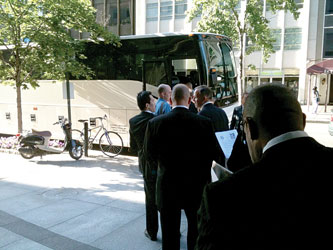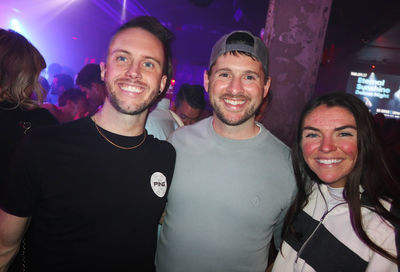Gay Vets and Top Brass
Pushing for DADT repeal, a group of gay and lesbian veterans meet with members of the Pentagon working group that is considering how to implement such a repeal
He said he was there “to help to secure jobs for people who want to serve our country.”
Despite having been “discharged twice under ‘Don’t Ask, Don’t Tell,’” as he told Metro Weekly, Jason Knight was up early Monday morning, May 10, along with nearly 40 other gay and lesbian veterans headed away from downtown D.C. on a bus taking them across the river to the Pentagon and the Navy Annex.
The group was the first such group of lesbian, gay and bisexual veterans to meet with the Pentagon working group looking at how to implement repeal of “Don’t Ask, Don’t Tell” – should Congress in fact repeal the law banning openly gay military service.

(Photo by Chris Geidner)
Separating into smaller groups once they arrived, about 10 people participating in the Veterans Lobby Day coordinated by the Human Rights Campaign and Servicemembers United met with Gen. Carter Ham and Jeh Johnson – the co-chairs of the working group – and others to discuss DADT-repeal implementation.
The other veterans headed to the Navy Annex where a meeting was handled by Capt. Anne Hammond, a deputy at the Diversity Directorate of the Navy, according to one participant.
Knight, who served in the Navy from 2001 to 2007 and now lives in California, said, “I was discharged once for annulling my marriage, and I was discharged a second time for speaking out against the policy.” As he explained the circumstances, the discharge paperwork the first time “wasn’t processed correctly” and he was “recalled back to service and was sent over to Kuwait for a year.”
Knight was in the group that met with Ham and Johnson and said on the bus ride to the Pentagon that he planned to tell the Pentagon officials his service story, noting, “The second time that I served, I served openly. My command knew that I was gay, that I was discharged once before.
“The biggest thing is that it wasn’t a problem. I continued to get accolades, still continued up in rank,” he said. “The fact is I was a good sailor and I did my job – just like a lot of other people are doing. Except a lot of people are under the fear that if they do let these little insights into their life, that they could potentially be discharged.”
A former communications officer in the Air Force who served under DADT in Afghanistan also was in the group that went to the Pentagon meeting. She spoke of the fear that Knight discussed, both for her and for her partner, who remains in active service in the military. Because of her partner’s military status, Metro Weekly agreed not to use the veteran’s name in this story.
Saying that the DADT policy was one of the main reasons she left the military, she explained, “It would be almost impossible to combine having a family – obviously military families are very special anyway. But to have a career and try to hide under the requirements of ‘Don’t Ask, Don’t Tell,’ I just thought it would be impossible.”
Looking up, she added, “Those are both things that I would have liked to have been able to do together, but it’s not possible under ‘Don’t Ask, Don’t Tell.’”
Retired Adm. Al Steinman, who serves on the Military Advisory Council of Servicemembers Legal Defense Network (SLDN) and works with several other groups, helped prepare the contingent of veterans for the Pentagon meetings on the bus ride from the I Street headquarters of Servicemembers United.
He told the veterans that the working-group members are “concerned about issues of implementation and they asked us to be part of the process of identifying those that they can put into their report that’s due 1 December.
“They’re trying to find out what are the issues most important to us as gay men and women in the military,” Steinman said. “What are the problems they face, and what are the solutions to those problems?”
After the group returned to the bus from the 90-minute meeting, the anonymous Air Force vet eran, Knight and several others said it went well and that there was a robust discussion about the questions Steinman raised. Members of the media were not permitted at any of the meetings.
Although an attendee of one of the meetings said that the veterans had agreed to keep the content of the meetings off-the-record , a few spoke about some points of the discourse outside of the substantive discussion of repeal implementation.
Sharing that military leaders had noted that some people at military bases they visited told them the DADT policy is working, the Air Force veteran with whom Metro Weekly spoke at length said officials, in the veteran’s words, have been asked, “Why do we need to change it, and why do we need to change it now?”
She said that the Pentagon officials – participants counted at least two three-star generals at the meeting in addition to Ham, who is a four-star general – were looking to her group Monday to answer those questions. The group, she said, explained to the officials that “obviously, our point is it doesn’t work, and here’s why it doesn’t work.”
She explained that “the personal stories, the personal answers to some of the questions that they’re dealing with on the nuts and bolts of how to implement this” were able to paint a clear picture of the answers to the working group’s questions.
“In that sense,” she said, “I think it was very successful. I think the messages were heard.”
At the same time the Pentagon and Navy Annex meetings were happening, another group of veterans attended a meeting with White House staff arranged by the Office of Public Engagement (OPE). The meeting included about double the number of veterans of the Pentagon group, and AmericaBlog’s Joe Sudbay reported that OPE Director Tina Tchen, presidential advisor Valerie Jarrett’s Chief of Staff Michael Strautmanis, Associate Counsel Alison Nathan and gay liaison Brian Bond met with them.
As many of those in the group who went to the Pentagon raised concerns before the meeting about the White House and Pentagon support for legislative repeal of DADT, the two veterans who spoke with Metro Weekly about the meeting appeared satisfied that the efforts at implementing any repeal, should it come, are going well.
“This is their job,” the Air Force veteran said, “and they’re focused. They’re doing a good job of carrying out the study and gathering all the information they possibly can.”
She added, “If I had to say, ‘What do I think – supposing Congress repeals the law – will the military do a good job of implementing the repeal?’ I think they will. I’m confident that these guys are serious about what they need to do.”
Knight echoed her comments, saying, “They’re really dedicated to doing it, and doing it right.”
The Air Force veteran, though, added an important caveat: “These guys are an advisory group. It remains to be seen how it would actually be carried out.”
Knight also spoke to concerns that the working group might not get needed input from gay and lesbian servicemembers because of the constraints of the current policy, which allows for the discharge of openly gay personnel.
“This was the very first meeting where we had LGBT veterans who were able to speak on behalf of those who can’t,” he said, adding that the group is working on ways to get comments from gay and lesbian current servicemembers.
Following a Monday afternoon of lobby training, Knight, the Air Force veteran and others went to Capitol Hill on Tuesday, May 11, to lobby their own and other targeted lawmakers for DADT repeal. At the same time, HRC promoted a “virtual lobby day,” urging supporters of repeal to “light up the congressional switchboard” and speak with their lawmakers’ offices to that end.
Leaving the Pentagon on Monday, another veteran who attended the meeting with Ham and Johnson, noted that during the meeting he attended, there had been a moment when he felt that the working-group representatives gained a significant perspective of how the repeal of DADT would not be as thorny a transition as some opponents of repeal claim.
That moment, he said, came when a member of the military brass asked the gay veterans if they would return to active service if DADT was repealed and nothing else kept them from rejoining.
All of them, he said, replied that they would.
Support Metro Weekly’s Journalism
These are challenging times for news organizations. And yet it’s crucial we stay active and provide vital resources and information to both our local readers and the world. So won’t you please take a moment and consider supporting Metro Weekly with a membership? For as little as $5 a month, you can help ensure Metro Weekly magazine and MetroWeekly.com remain free, viable resources as we provide the best, most diverse, culturally-resonant LGBTQ coverage in both the D.C. region and around the world. Memberships come with exclusive perks and discounts, your own personal digital delivery of each week’s magazine (and an archive), access to our Member's Lounge when it launches this fall, and exclusive members-only items like Metro Weekly Membership Mugs and Tote Bags! Check out all our membership levels here and please join us today!




















